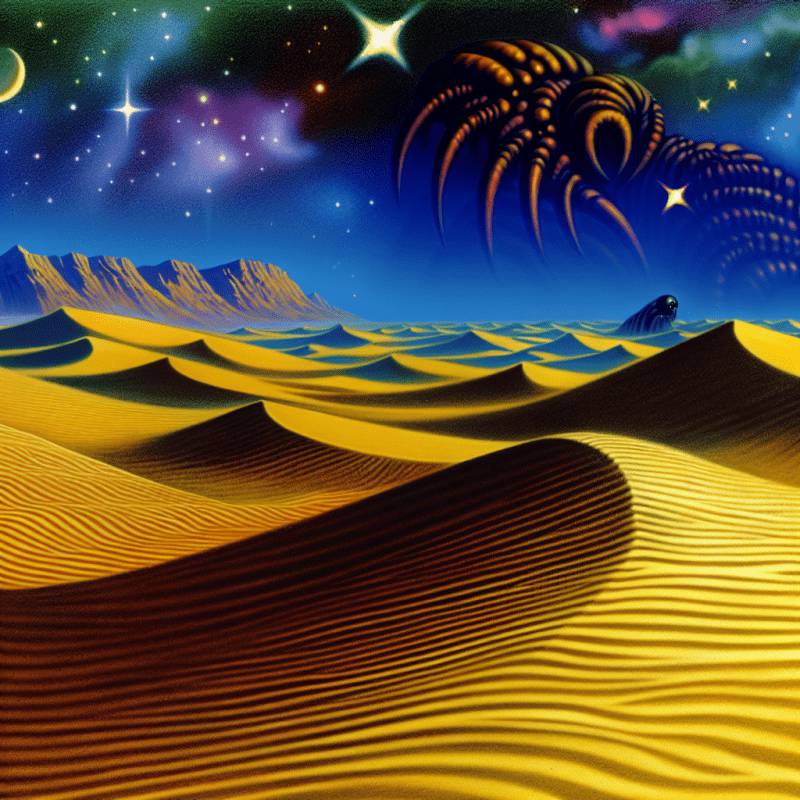Exploring the Impact of Frank Herbert’s ‘Dune’ on Modern Sci-fi Culture
“Dune,” a masterpiece penned by Frank Herbert, has left an indelible mark on popular science fiction culture. Its influence is so profound that it has shaped the genre’s landscape, inspiring countless authors, filmmakers, and artists. The novel, first published in 1965, is a rich tapestry of political intrigue, environmentalism, and complex human relationships, all set against the backdrop of a distant, desert planet. It’s a testament to Herbert’s genius that “Dune” continues to captivate audiences more than half a century later.
Herbert’s “Dune” is a masterclass in world-building. The novel’s setting, the desert planet of Arrakis, is as much a character as any of the human protagonists. Its harsh, unforgiving landscape, teeming with giant sandworms and precious spice, is a vividly realized environment that has inspired countless other fictional worlds. The planet’s intricate ecology, its native Fremen people, and the coveted spice melange, which grants psychic abilities and extends life, are all elements that have been echoed in numerous other works of science fiction.
The novel’s complex political machinations and exploration of power dynamics have also had a significant impact on the genre. The interstellar feudal society Herbert created, with its noble houses, religious factions, and imperial politics, has been a blueprint for many science fiction narratives. George R.R. Martin, the author of “A Song of Ice and Fire,” has acknowledged the influence of “Dune” on his own work, particularly in its depiction of power struggles and political intrigue.
“Dune” also broke new ground in its exploration of environmental themes. Long before climate change became a mainstream concern, Herbert was writing about the delicate balance of ecosystems and the impact of human activity on the environment. The Fremen’s struggle to survive and their dream of transforming their arid home into a lush paradise is a powerful commentary on environmental stewardship that resonates strongly today.
Moreover, Herbert’s novel has had a profound influence on popular culture beyond the written word. The 1984 film adaptation by David Lynch, while not a commercial success, has gained a cult following for its unique visual style and ambitious storytelling. The upcoming 2021 adaptation by Denis Villeneuve, with its star-studded cast and high production values, is eagerly anticipated by fans and newcomers alike. “Dune” has also inspired video games, board games, and a television series, further cementing its place in the cultural zeitgeist.
But perhaps the most significant impact of “Dune” is its influence on the “Star Wars” franchise. George Lucas has acknowledged that Herbert’s novel was a major inspiration for his space opera. From the desert planet of Tatooine to the concept of a mystical, mind-altering force, the echoes of “Dune” are unmistakable in the “Star Wars” universe.
In conclusion, Frank Herbert’s “Dune” has had a tremendous influence on popular science fiction culture. Its intricate world-building, complex political themes, and environmental commentary have inspired countless other works. Its impact can be seen in everything from “Game of Thrones” to “Star Wars,” and its influence shows no signs of waning. As we anticipate the latest film adaptation, it’s clear that “Dune” will continue to shape the landscape of science fiction for years to come.
The Legacy of Frank Herbert: How ‘Dune’ Shaped the Sci-fi Genre

“Dune” is not just a book; it’s a phenomenon. Penned by the visionary Frank Herbert, this epic science fiction novel has left an indelible mark on popular culture, shaping the genre in ways that continue to resonate today. Herbert’s magnum opus, “Dune,” is a masterclass in world-building, political intrigue, and complex character development, all set against the backdrop of a harsh, desert planet. It’s a testament to Herbert’s genius that his work has not only stood the test of time but has also profoundly influenced the trajectory of science fiction.
“Dune” is a rich tapestry of ideas, a grand narrative that explores themes of power, religion, ecology, and human nature. It’s a story that transcends the confines of its pages, spilling over into the collective consciousness of its readers and the broader science fiction community. Herbert’s creation of the planet Arrakis, with its vast deserts and deadly sandworms, is a feat of imagination that has inspired countless other authors and filmmakers. The intricate political machinations and the deeply philosophical undertones of “Dune” have set a high bar for the genre, pushing it into new territories of complexity and depth.
Herbert’s influence is not confined to the literary world. His work has had a profound impact on the realm of film and television as well. The 1984 film adaptation of “Dune,” directed by David Lynch, is a cult classic, and the recent 2021 adaptation by Denis Villeneuve has reignited interest in Herbert’s universe. The visual aesthetics of these films, heavily influenced by Herbert’s vivid descriptions, have shaped the look and feel of many subsequent science fiction films. The grandeur and scale of “Dune” have set a standard for epic storytelling in the genre.
Moreover, Herbert’s influence extends to the world of video games. The real-time strategy game “Dune II” is considered a pioneer in its genre, and its success spawned a series of sequels and spin-offs. The game’s mechanics, which involve resource management and strategic combat, mirror the political and economic struggles depicted in the novel. This innovative adaptation of Herbert’s work demonstrates the versatility of his ideas and their ability to transcend different mediums.
“Dune” has also had a significant impact on popular culture at large. Phrases from the novel, such as “the spice must flow,” have entered the cultural lexicon, and the book’s themes have been explored in music, art, and fashion. The novel’s exploration of environmental issues, particularly its focus on the delicate balance of Arrakis’s ecosystem, has resonated with contemporary audiences concerned about climate change.
Frank Herbert’s “Dune” is a cornerstone of science fiction, a work of staggering imagination and depth that has shaped the genre in countless ways. Its influence can be seen in the pages of other novels, on the silver screen, in the mechanics of video games, and in the broader cultural landscape. Herbert’s vision of a far-future universe, filled with intrigue, danger, and wonder, has captivated the minds of millions and continues to inspire new generations of readers and creators. The legacy of “Dune” is a testament to the power of science fiction to explore complex ideas and to push the boundaries of our imagination.
The Enduring Influence of ‘Dune’ on Popular Sci-fi Narratives and Themes
“Dune,” a novel penned by Frank Herbert in 1965, has left an indelible mark on the landscape of science fiction, shaping the genre’s narratives and themes in ways that continue to resonate today. The book, a sprawling epic of political intrigue, environmentalism, and mysticism set on the desert planet of Arrakis, has not only captivated readers for over half a century but has also profoundly influenced countless authors, filmmakers, and game designers.
Herbert’s “Dune” is a masterclass in world-building, a skill that has become a cornerstone of modern science fiction. The intricate details of the planet Arrakis, from its harsh desert landscapes to its complex social structures and the coveted spice Melange, have set a high bar for subsequent creators. The depth and richness of Herbert’s universe have inspired a generation of writers to craft their own intricate worlds, from George R.R. Martin’s “Game of Thrones” to James Cameron’s “Avatar.”
The novel’s exploration of environmental themes was groundbreaking for its time and continues to be relevant today. Herbert’s depiction of Arrakis as a planet whose ecology is inextricably linked to its society and politics was a novel concept in the 1960s. This ecological consciousness has since become a recurring theme in science fiction, seen in works like “The Expanse” series and “Interstellar.” Herbert’s vision of a planet being exploited for its resources resonates in an era of increasing environmental awareness and concern.
“Dune” also delves into the complexities of power and politics, themes that have become staples in the science fiction genre. The intricate political machinations of the various factions vying for control of Arrakis and its precious spice have been echoed in numerous subsequent works. The political intrigue and power struggles in “Star Wars” and “Battlestar Galactica” owe a debt to Herbert’s pioneering narrative.
Moreover, Herbert’s exploration of religion and mysticism in “Dune” has had a profound impact on science fiction. The Bene Gesserit, a powerful and mysterious religious order, and the concept of the Kwisatz Haderach, a prophesied messiah, have influenced a multitude of science fiction narratives. The Jedi and the Force in “Star Wars,” the Cylons’ belief in a singular God in “Battlestar Galactica,” and the religious themes in “The Matrix” all bear traces of Herbert’s influence.
The influence of “Dune” extends beyond literature and film to the realm of video games. The real-time strategy game “Dune II” is considered a seminal work in the genre, and the game’s mechanics and setting have influenced countless successors, including the hugely popular “Command & Conquer” and “Warcraft” series.
In conclusion, Frank Herbert’s “Dune” has had a tremendous influence on popular sci-fi culture, shaping narratives and themes in literature, film, and video games. Its intricate world-building, exploration of environmental themes, complex political narratives, and incorporation of religion and mysticism have set a high bar for the genre. More than half a century after its publication, “Dune” continues to inspire and influence, testament to the enduring power of Herbert’s vision.



